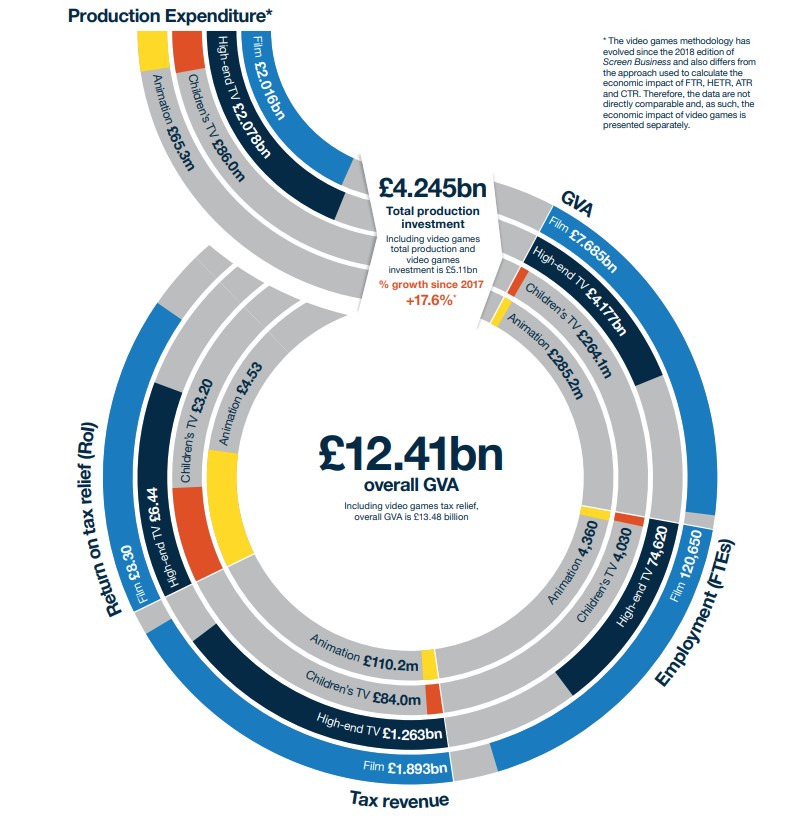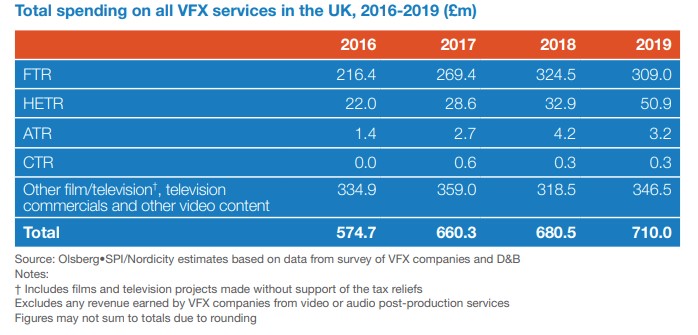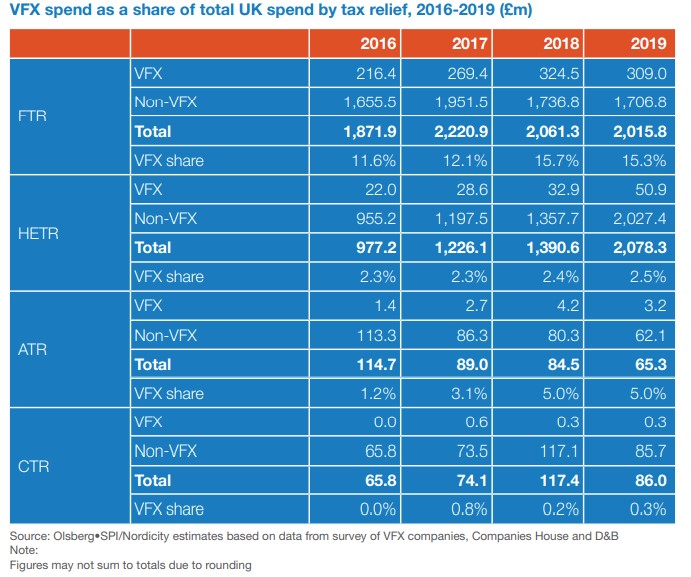The UK’s VFX industry showed steady growth over the period analysed by the BFI’s Screen Business report (published 13th December) but when combined with other evidence, a picture emerges of a strong opportunity that is not being fully realised due to the structure of the tax incentives.

The BFI have launched the latest version of their “Screen Business” report, which reveals the highest ever return on investment to the UK economy from the screen sector tax reliefs. Every £1 of film tax relief generated £8.30 of value for the UK economy and each £1 of high-end TV relief returned £6.44 of value.
The report covers 2017 to 2019 and updates the 2016 figures. It provides a pre-pandemic snapshot of the industry. Whilst the coronavirus restrictions made 2020 a poor year, the screen industry has made a strong recovery in 2021, but these years are beyond the scope of this report.
Even though VFX does not have a specific tax credit in the UK to incentivise inward investment, it can be an eligible expense within claims for the Film Tax Relief (FTR) or High End TV Tax Relief (HETR), Animation Tax Relief (ATR) or Children’s TV Tax Relief (CTR).
From a combined UK VFX spend during 2019 of £710m for tax relief related activity and non-tax relief related work, such as advertising, the report estimates that the sector contributed £1.68bn in GVA to the UK economy and supported 27,430 jobs. This is known to be an under estimate as the analysis of spill-over impacts attributable to advertising and brand promotion work, which creates considerable value through increased sales of the advertised goods and services, was outside the scope of the report.

The overall UK VFX workforce was estimated at 10,680 FTE (full time equivalents), of which 5,470 were employed on tax relief related work. These jobs generate high productivity, delivering £89,743 of GVA per FTE, which is £23,643 more per person than the average for the whole UK economy.
In 2019, an estimated £363.5 million was spent on VFX services in the UK for projects claiming FTR, HETR, ATR and CTR. This was up from £239.8m in 2016; a growth of 51.6%.
Overall production spending via the FTR rose by 7.6% between 2016 and 2019 but the VFX portion of FTR spending rose by 42% over the same period, to reach £309m in 2019, which is 15.3% of the total FTR supported spending.
There has been strong global growth in HETV production driven by the streaming video providers and overall the UK has seen HETV production spend grow by 113% from £977.2m in 2016 to £2078.3m in 2019. The VFX spend in the UK claiming HETR, mirrors this increase and has risen by 131% since 2016 and stood at £50.9m in 2019. However this represents just 2.5% of the total HETR claimed in that year.

The growth in spending of the whole UK VFX sector was 24% over the years 2016 to 2019 with most of that growth occurring in 2017 (15%) . These figures should be compared to the growth of VFX spending in competitor territories such as Quebec, which grew by 124% over the same period. In 2018, spending in Quebec grew by 88% in a single year, compared to just 3% growth in the same year in the UK. This implies an erosion of the UK’s global market share for VFX despite the growth shown in the Screen Business report.
Productions can claim 25% tax relief on their UK spending via the FTR, HETR, ATR or CTR incentives. However, the relief is capped once a production has spent 80% of its budget in the UK. Any UK spending beyond 80% receives 0% relief. Often this impacts the VFX spending in the UK, a part of the production process which is easily transferred to another territory, where further tax incentives can be claimed. Estimates suggests that over £300 million per year of VFX work is performed outside the UK on productions that have filmed in the UK and claimed UK tax credits.
“The 80% cap is written into UK law, but this was to comply with EU regulations to which the UK is no longer bound since Brexit. The cap has never made any sense and disincentivises productions from remaining in the UK for VFX work if they have also filmed here. The UK government should now legislate to neutralise the effect of the cap, which is holding back the UK’s VFX industry from achieving its full potential, when the global market for VFX is presenting such a huge opportunity for economic growth, innovation and the creation of highly skilled, highly productive jobs in the UK.”
Neil Hatton, CEO of UK Screen Alliance
“This is an important report at a key time for the UK. It outlines the major opportunity for new jobs and a larger share of the world spend on content. I hope it is used to drive government policy.”
William Sargent, CEO of Framestore
“The BFI Screen report shows a healthy steady growth in our industry, one which is continuing to grow at a rapid pace. Now is an ideal time to revisit the cap on the UK spend, especially with regards to VFX.”
Lucy Ainsworth Taylor, CEO of Bluebolt
“The report shows the huge benefit of the tax relief to the UK economy, it’s clearly working well. But even when a thing works well, it can and should be improved. The VFX sector, which has been identified as an important element of the UK film industry, is the part of the process that suffers most from the cap. Removal of the cap is a huge missed opportunity. It would prevent the export of large quantities of work overseas. A government which promoted Brexit as a boon to our economy should not retain this throwback to the pre-Brexit era. We should be giving UK based VFX companies the ability to compete on price as well as talent to win and retain this work. The boost to the VFX sector would bring growth, investment and importantly retain skills that are being exported. It would create new jobs in an area of the film industry that is perhaps more accessible than many others”.
Rachael Penfold, Director at One of Us
“It’s a very global marketplace and, post-Brexit, new hubs with good incentives are popping up in Europe to add to the competition. There is a huge opportunity to maintain and grow the UK industry further if we can remain attractive by creating the right conditions for inward investment to continue. If we grow, nurture and support the next generation of talent we are well positioned to continue this trend and remain a world leading hub for VFX.”
Tim Caplan, founder of Union VFX
READ Animation UK response to Screen Business Report 2021 here









